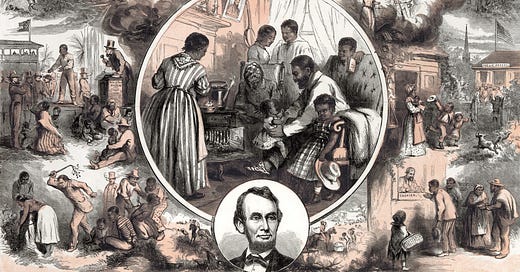While I hope you all are enjoying the day off, I've always struggled with giving today as a public holiday, especially when so much work still needs to be done that would be more powerful than the symbolism of a public holiday.
Here’s the thing about Juneteenth: it’s a day heavy with history, soaked in the blood and sweat of ancestors who clawed their way to a semblance of freedom. But making it a federal holiday feels like a slick pat on the back, a way for the nation to say, “Look how far we’ve come,” without acknowledging the vast distance left to travel. There’s an unsettling comfort in holidays, a tendency to let the day pass with barbecues and picnics, forgetting the urgency that sparked its existence.
Illustrated print by Thomas Nast, depicting life before and after the Emancipation Proclamation.
We’re at risk of turning a day meant for reflection and action into another excuse for a three-day weekend. It’s easier to celebrate freedom when you’re not confronted with the stark reality that more Black men are in prison, jail, or on probation today than were enslaved in 1850. This isn’t a time for complacency; it’s a call to action that’s getting lost in the shuffle of federal holiday status.
Juneteenth, inaccurately hailed as the end of slavery, creates a comforting narrative of progress. But in truth, systemic racism continues to weave its way through every institution. The criminal justice system, housing, education, employment—all stained with the legacy of a nation built on the backs of enslaved people. Turning Juneteenth into a federal holiday risks obscuring these truths, allowing the celebration to overshadow the ongoing fight for justice.
What’s more, making Juneteenth a federal holiday provides cover for performative allyship. It’s an easy out for those who, despite claiming solidarity, aren’t willing to engage in the deep, often uncomfortable work of dismantling racist structures. It allows them to join in the festivities without confronting their own biases or the systemic inequities that continue to oppress Black Americans. It’s a way to feel good about progress without contributing to it.
Given that the decision to make Juneteenth a federal holiday was born from the Black Lives Matter movement, it should reflect the movement’s goals of anti-racist action and education. Instead of a holiday, Juneteenth should be a national day of anti-racist action—a day for educating ourselves and others about the history and present-day impacts of slavery and systemic racism. It should be a day of community organizing, advocacy, and reflection on how we can collectively work towards a more just and equitable society.
Beyond the missed opportunity of true allyship, there’s also a financial argument against making it a public holiday. America’s 157,540,000 working adults make an average of $190.88/day. Redirecting just 3-4% of the wages generated on Juneteenth could mean more than $1 trillion for Black Americans. This approach ties directly into the broader conversation about reparations, acknowledging the historical and ongoing economic disparities faced by Black communities. Redirecting a portion of the day’s economic productivity towards reparative measures would be a tangible step towards addressing the economic injustices rooted in slavery and perpetuated through systemic racism.
In the end, while recognizing Juneteenth as a federal holiday might seem like a step towards honoring Black history, it risks fostering complacency and performative allyship rather than genuine progress. Transforming Juneteenth into a national day of anti-racist action and education would more effectively honor its significance and contribute to the ongoing fight for racial justice. We need to move beyond symbolic gestures and commit to substantive change.




